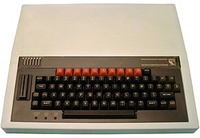One thing that is becoming increasingly clear from taking the OU 'H800' course is that there really needs to be more of a discussion on what 'technology' actually means. I say that because in the curriculum that we're adopting in our wee primary school, we have a 'technology' component - which to everyone normally means 'computers' or 'the internet'.
It's clear that for the most part the course in H800 is thinking more along these lines. I guess their argument is that it's the use of 'modern' technologies that is being considered as part of a distance learning course. The key issues appear to be how to use the modern technology to engineer interactions or replacements for what a student or pupil might receive if they do not have 'face to face' interaction.
But I'm becoming more convinced that maybe we should be focussing more on the 'older' technologies in particular to focus more on how to exploit those technologies.
For instance, it seems clear that the value of 'blogging' in education has not been fully recognised as necessarily having a clear educational value (Kerawalla et al, 2008), which does not mean that it cannot, or should not be explored. However, my time here in considering the education around the emerging nations of the Pacific, convinces me that there is considerable mileage to be had through exploring more traditional print technology, and in particular how this could be incorporated with long wave radio broadcasts. Current distance education offerings from the premiere university of the region, still rely on boringly laid out 'stuffy' course books that incorporate inappropriate clip-art, bad photocopies of National Geographic articles and an editorial style that encourages a 'dry' and disengaged writing style. Clearly making changes to these issues is making more effective use of the 'print' technology. There was an attempt between the mid 1990s for about a decade to conduct satellite tutorials. But again there was no attempt to 'produce' audio content that could be disseminated outside of the satellite receiving stations of the the university. The result was that only a few select students could access these tutorials and they were more or less an attempt to replicate a face to face tutorial. Radio production remains a completely unexplored, viable, cheap technology to enhance the distance education (Perraton, 2000).
I'm hoping that the course I'm studying has an opportunity to make an evaluation on existing, proven technologies and consider more of the reasons why they are not implemented in preference to trying out newer and unexplored technolgoies.
References
Kerawalla, L., Minocha, S., Kirkup, G., & Conole, G. (2008, March). Characterising the different blogging behaviours of students on an online distance learning course. Learning, Media, & Technology, 33(1), 21-33.
Perraton, H. D. (2000). Open and distance learning in the developing world (Routledge studies in distance education). London ; New York: Routledge.

